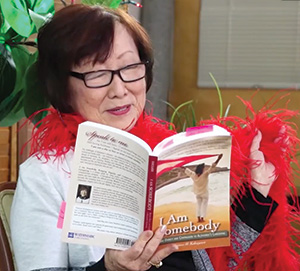By Simone Nazzal, Del Oro Caregiver Resource Center for ACC News
In December 2022, I had the opportunity to interview award-winning writer, poet, and teacher, Frances Kakugawa, at ACC Senior Services. It was a livestreamed event produced by Del Oro Caregiver Resource Center and ACC.
I first learned about Frances Kakugawa by word-of-mouth. One of my community partners, Denise Davis of the Alzheimer’s Association of Northern California & Northern Nevada, shared the details of a special support group that Ms. Kakugawa facilitates for me to pass along to clients at Del Oro Caregiver Resource Center. In the Dementia Caregiver Writing & Poetry Support Group, Ms. Kakugawa works closely with unpaid family caregivers to help them process and articulate their experiences supporting a loved one with a chronic or degenerative disease through the written word. Before launching this group in Sacramento, she piloted a similar one in Hawaii through the Aloha Chapter of the Alzheimer’s Association and published a resource guide/poetry collection called Mosaic Moon: Caregiving through Poetry (2002). As a lifelong student of literature, writer, and former caregiver, I was interested in learning more about the intersection between writing and caregiving. So, I purchased several of her books and started reading.

Years earlier, Ms. Kakugawa taught a memoir-writing class at ACC, so returning to the campus felt like a homecoming. Up until our conversation, I had not met her in person, but she already felt familiar to me. After exploring Mosaic Moon, I Am Somebody: Bringing Dignity and Compassion to Alzheimer’s Caregiving (2014), and Wordsworth Dances the Waltz (2007) on my own, I was eager to talk with her. I was especially curious to learn more about her experience caring for a mother with Alzheimer’s disease, particularly how she used poetry to convey the experience. Similarly, I cared for my mother and ultimately turned to writing poetry as a way to deal with my grief after she passed away.
Much to my delight, early in our conversation, Ms. Kakugawa whipped out a fluffy red stole and recited “A Feather Boa and a Toothbrush:”
It is 3 a.m.
I am on my hands and knees
With toothbrush in one hand
A glass of hot tap water in my other
Scrubbing BM off my mother’s
Bathroom floor.
Before a flicker of self pity can set in
A vivid image enters my mind.
An image of a scarlet feather boa
Impulsively bought from Neiman Marcus,
Delicately wrapped in white tissue
Awaiting in my cedar chest
For some enchanted evening.
The contrast between my illusional lifestyle of feather boas,
Opium perfume and black velvet
And my own reality of toothbrushes,
Bathroom tiles and BM at 3 a.m.
Overwhelms me with silent laughter.
The humor in this poem emerges from the vivid contrasts, underlined—of course—by the “scarlet feather boa.” In caregiving, humor often surfaces during these moments of cognitive dissonance, when circumstances become so ridiculous that all we can do is laugh. Although I did not experience exactly what the poem describes, I recall those moments where I felt like a spectator, both providing care and witnessing the care exchange at the same time. Like the speaker in “A Feather Boa and a Toothbrush,” I eventually learned to leverage such spectating to reshape reality into something softer when it all felt like too much and “before a flicker of self-pity [could] set in.”

In addition to some moments of laughter, the interview with Ms. Kakugawa also provided amazing insight into the rewards of caregiving. On the one hand, caregiving allows us to learn more about ourselves, but it is also an opportunity to teach future generations the value of interdependence. Interestingly, our discussion of her series of children’s books about “Wordsworth”—the young mouse and emerging poet who lives with his family in Hawaii—extended hope for some of the most “squeezed” caregivers: those in the Sandwich Generation. Sandwich Generation caregivers are individuals who are parenting a child and providing care for an older adult simultaneously (and often within the same household). We looked at Wordsworth Dances the Waltz, which explores Wordsworth’s experience of living with a grandmother who has cognitive decline. Ms. Kakugawa specifically highlighted how children should have the opportunity to engage with elders experiencing cognitive decline and learn what is happening in a developmentally appropriate way. Children, she believes, can actually help adults cope with and make sense of diseases like dementia, because they have the imaginative capacity to see beyond the “reality” of the situation. What is reality, really, when a loved one operates from a different point in time, sees people we cannot, or communicates only through body language and behaviors? Children may help their parents discover more meaning and humor in the changes and transitions involved in caring for someone with dementia (or any degenerative disease), while also developing the compassion and empathy they will need to maintain enduring relationships.
They say “never meet your heroes,” but Ms. Kakugawa did not disappoint me in the slightest. She has taken an art form and used it to help people. Caregivers need the space to reflect and unpack the valuable work they are doing for their loved ones. Writing offers that space and helps caregivers who feel isolated recognize that they are not alone.
Learn more about award-winning author Frances Kakugawa by visiting her website at www.francesk.org; her books are also available at major book retailers and on Amazon.com. If you are interested in participating in the support group she facilitates, please contact the Alzheimer’s Association.


Add a Comment